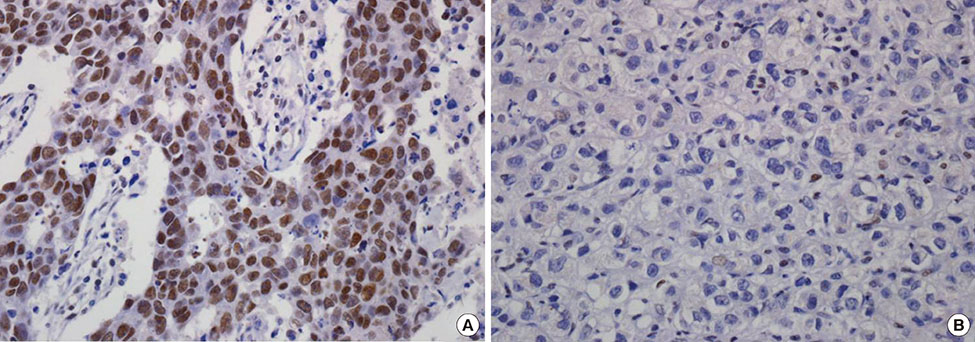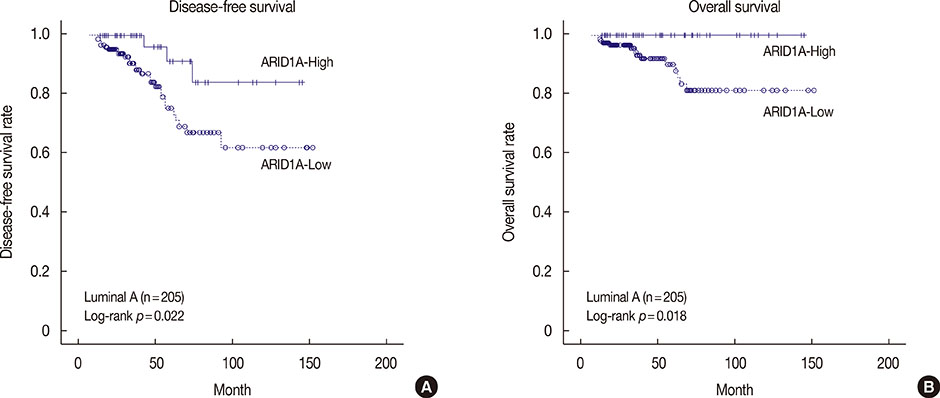J Breast Cancer.
2015 Dec;18(4):339-346. 10.4048/jbc.2015.18.4.339.
Loss of Tumor Suppressor ARID1A Protein Expression Correlates with Poor Prognosis in Patients with Primary Breast Cancer
- Affiliations
-
- 1Department of Pathology, Soonchunhyang University Cheonan Hospital, Soonchunhyang University College of Medicine, Cheonan, Korea. c84103@schmc.ac.kr
- 2Department of Surgery, Soonchunhyang University Cheonan Hospital, Soonchunhyang University College of Medicine, Cheonan, Korea.
- 3Department of Hemato-Oncology, Internal Medicine, Soonchunhyang University Cheonan Hospital, Soonchunhyang University College of Medicine, Cheonan, Korea.
- KMID: 2176282
- DOI: http://doi.org/10.4048/jbc.2015.18.4.339
Abstract
- PURPOSE
Somatic mutations of the chromatin remodeling AT-rich interactive domain 1A (SWI-like) gene (ARID1A) have been identified in many human cancers, including breast cancer. The purpose of this study was to evaluate the nuclear expression of ARID1A in breast cancers by immunohistochemistry (IHC) and to correlate the findings to clinicopathologic variables including prognostic significance.
METHODS
IHC was performed on tissue microarrays of 476 cases of breast cancer. Associations between ARID1A expression and clinicopathologic characteristics and molecular subtype were retrospectively analyzed.
RESULTS
Low expression of ARID1A was found in 339 of 476 (71.2%) cases. Low expression of ARID1A significantly correlated with positive lymph node metastasis (p=0.027), advanced pathologic stage (p=0.001), low Ki-67 labeling index (p=0.003), and negative p53 expression (p=0.017). The ARID1A low expression group had significantly shorter disease-free and overall survival than the ARID1A high expression group (p<0.001 and p<0.001, respectively). Multivariate analysis demonstrated that low expression of ARID1A was a significant independent predictive factor for poor disease-free and overall survival in patients with breast cancer (disease-free survival: hazard ratio, 0.38, 95% confidence interval [CI], 0.20-0.73, p=0.004; overall survival: hazard ratio, 0.11, 95% CI, 0.03-0.46, p=0.003). In patients with luminal A type disease, patients with low ARID1A expression had significantly shorter disease-free and overall survival rates than patients with high ARID1A expression (p=0.022 and p=0.018, respectively).
CONCLUSION
Low expression of ARID1A is an independent prognostic factor for disease-free and overall survival in breast cancer patients and may be associated with luminal A type disease. Although the biologic function of ARID1A in breast cancer remains unknown, low expression of ARID1A can provide valuable prognostic information.
MeSH Terms
Figure
Reference
-
1. Yoon JH, Kim MJ, Kim EK, Moon HJ. Imaging surveillance of patients with breast cancer after primary treatment: current recommendations. Korean J Radiol. 2015; 16:219–228.
Article2. Mamo A, Cavallone L, Tuzmen S, Chabot C, Ferrario C, Hassan S, et al. An integrated genomic approach identifies ARID1A as a candidate tumor-suppressor gene in breast cancer. Oncogene. 2012; 31:2090–2100.
Article3. Jones S, Li M, Parsons DW, Zhang X, Wesseling J, Kristel P, et al. Somatic mutations in the chromatin remodeling gene ARID1A occur in several tumor types. Hum Mutat. 2012; 33:100–103.
Article4. Wu JN, Roberts CW. ARID1A mutations in cancer: another epigenetic tumor suppressor? Cancer Discov. 2013; 3:35–43.5. Wilson BG, Roberts CW. SWI/SNF nucleosome remodellers and cancer. Nat Rev Cancer. 2011; 11:481–492.
Article6. Itamochi H, Oumi N, Oishi T, Shoji T, Fujiwara H, Sugiyama T, et al. Loss of ARID1A expression is associated with poor prognosis in patients with stage I/II clear cell carcinoma of the ovary. Int J Clin Oncol. 2015; 20:967–973.
Article7. Bosse T, ter Haar NT, Seeber LM, v Diest PJ, Hes FJ, Vasen HF, et al. Loss of ARID1A expression and its relationship with PI3K-Akt pathway alterations, TP53 and microsatellite instability in endometrial cancer. Mod Pathol. 2013; 26:1525–1535.
Article8. Mao TL, Shih IeM. The roles of ARID1A in gynecologic cancer. J Gynecol Oncol. 2013; 24:376–381.
Article9. Cho H, Kim JS, Chung H, Perry C, Lee H, Kim JH. Loss of ARID1A/BAF250a expression is linked to tumor progression and adverse prognosis in cervical cancer. Hum Pathol. 2013; 44:1365–1374.
Article10. Park JH, Lee C, Suh JH, Chae JY, Kim HW, Moon KC. Decreased ARID1A expression correlates with poor prognosis of clear cell renal cell carcinoma. Hum Pathol. 2015; 46:454–460.
Article11. Kim MJ, Gu MJ, Chang HK, Yu E. Loss of ARID1A expression is associated with poor prognosis in small intestinal carcinoma. Histopathology. 2015; 66:508–516.
Article12. Rao Q, Xia QY, Wang ZY, Li L, Shen Q, Shi SS, et al. Frequent co-inactivation of the SWI/SNF subunits SMARCB1, SMARCA2 and PBRM1 in malignant rhabdoid tumours. Histopathology. 2015; 67:121–129.
Article13. Wiegand KC, Sy K, Kalloger SE, Li-Chang H, Woods R, Kumar A, et al. ARID1A/BAF250a as a prognostic marker for gastric carcinoma: a study of 2 cohorts. Hum Pathol. 2014; 45:1258–1268.
Article14. Zhang Y, Xu X, Zhang M, Bai X, Li H, Kan L, et al. ARID1A is down-regulated in non-small cell lung cancer and regulates cell proliferation and apoptosis. Tumour Biol. 2014; 35:5701–5707.
Article15. Balbás-Martínez C, Rodríguez-Pinilla M, Casanova A, Domínguez O, Pisano DG, Gómez G, et al. ARID1A alterations are associated with FGFR3-wild type, poor-prognosis, urothelial bladder tumors. PLoS One. 2013; 8:e62483.
Article16. Maeda D, Mao TL, Fukayama M, Nakagawa S, Yano T, Taketani Y, et al. Clinicopathological significance of loss of ARID1A immunoreactivity in ovarian clear cell carcinoma. Int J Mol Sci. 2010; 11:5120–5128.
Article17. Wiegand KC, Shah SP, Al-Agha OM, Zhao Y, Tse K, Zeng T, et al. ARID1A mutations in endometriosis-associated ovarian carcinomas. N Engl J Med. 2010; 363:1532–1543.
Article18. Zhang X, Zhang Y, Yang Y, Niu M, Sun S, Ji H, et al. Frequent low expression of chromatin remodeling gene ARID1A in breast cancer and its clinical significance. Cancer Epidemiol. 2012; 36:288–293.
Article19. Zhao J, Liu C, Zhao Z. ARID1A: a potential prognostic factor for breast cancer. Tumour Biol. 2014; 35:4813–4819.
Article20. Lakhani SR EI, Schnitt SJ, Tan PH, van de Vijver MJ. WHO Classification of Tumours of the Breast. 4th ed. Lyon: International Agency for Research on Cancer;2012.21. Im S, Choi HJ, Yoo C, Jung JH, Jeon YW, Suh YJ, et al. Hedgehog related protein expression in breast cancer: gli-2 is associated with poor overall survival. Korean J Pathol. 2013; 47:116–123.
Article22. Allred DC, Harvey JM, Berardo M, Clark GM. Prognostic and predictive factors in breast cancer by immunohistochemical analysis. Mod Pathol. 1998; 11:155–168.23. Guan B, Gao M, Wu CH, Wang TL, Shih IeM. Functional analysis of in-frame indel ARID1A mutations reveals new regulatory mechanisms of its tumor suppressor functions. Neoplasia. 2012; 14:986–993.
Article24. Cornen S, Adelaide J, Bertucci F, Finetti P, Guille A, Birnbaum DJ, et al. Mutations and deletions of ARID1A in breast tumors. Oncogene. 2012; 31:4255–4256.
Article25. Zhang X, Sun Q, Shan M, Niu M, Liu T, Xia B, et al. Promoter hypermethylation of ARID1A gene is responsible for its low mRNA expression in many invasive breast cancers. PLoS One. 2013; 8:e53931.
Article26. Lee SY, Kim DW, Lee HS, Ihn MH, Oh HK, Park do J, et al. Loss of ATrich interactive domain 1A expression in gastrointestinal malignancies. Oncology. 2015; 88:234–240.
Article27. Guan B, Wang TL, Shih IeM. ARID1A, a factor that promotes formation of SWI/SNF-mediated chromatin remodeling, is a tumor suppressor in gynecologic cancers. Cancer Res. 2011; 71:6718–6727.
Article28. Fadare O, Gwin K, Desouki MM, Crispens MA, Jones HW 3rd, Khabele D, et al. The clinicopathologic significance of p53 and BAF-250a (ARID1A) expression in clear cell carcinoma of the endometrium. Mod Pathol. 2013; 26:1101–1110.
Article29. Bitler BG, Aird KM, Garipov A, Li H, Amatangelo M, Kossenkov AV, et al. Synthetic lethality by targeting EZH2 methyltransferase activity in ARID1A-mutated cancers. Nat Med. 2015; 21:231–238.
Article
- Full Text Links
- Actions
-
Cited
- CITED
-
- Close
- Share
- Similar articles
-
- Prognostic Significance of ARID1A Expression Patterns Varies with Molecular Subtype in Advanced Gastric Cancer
- High MicroRNA-370 Expression Correlates with Tumor Progression and Poor Prognosis in Breast Cancer
- The Expression of p53, c-erbB-2 and nm23 Proteins in Breast Cancer
- Loss of PTEN Expression in Primary Lung Cancer
- Loss of ARID1A Expression in Gastric Cancer: Correlation with Mismatch Repair Deficiency and Clinicopathologic Features




